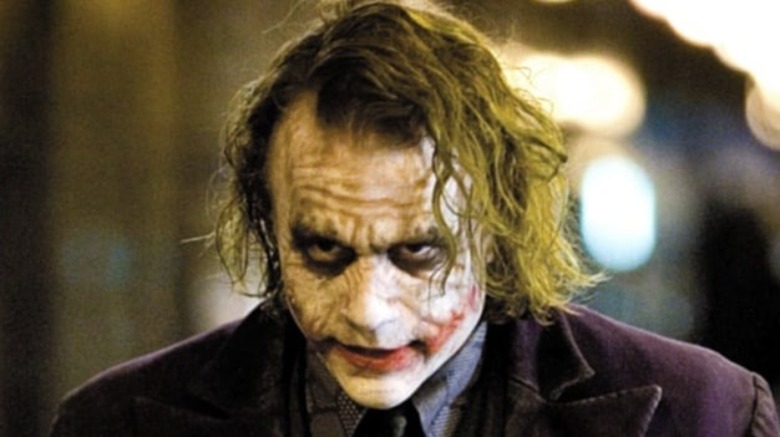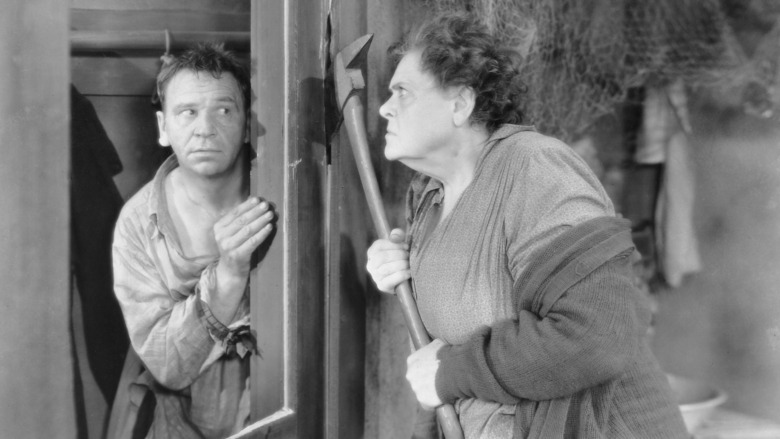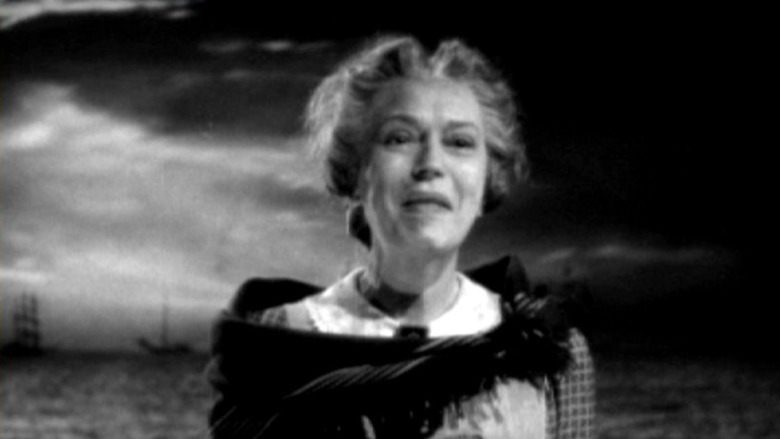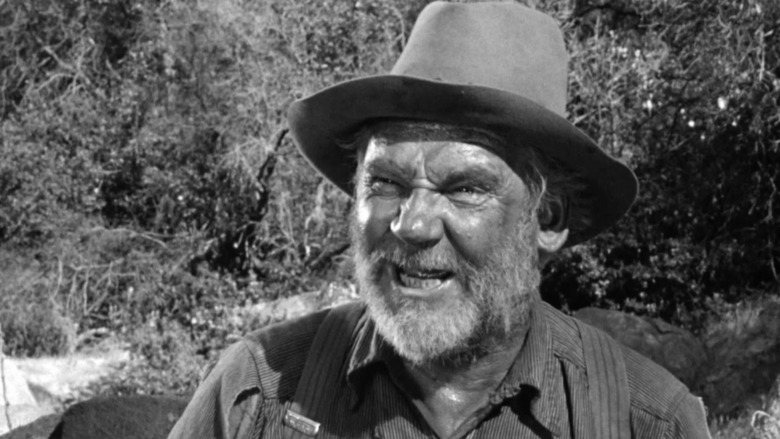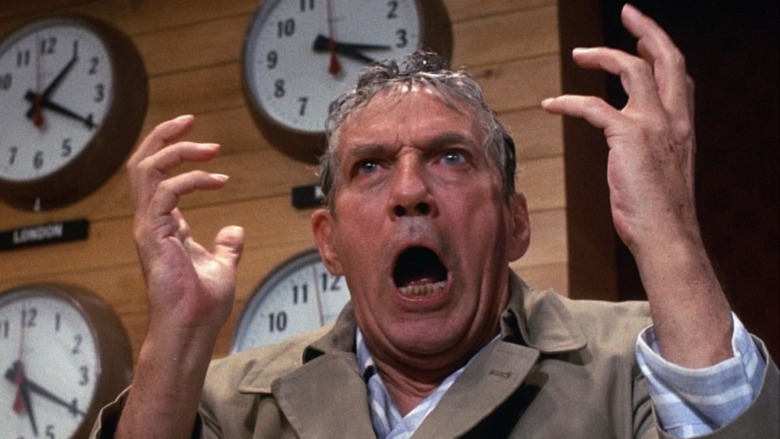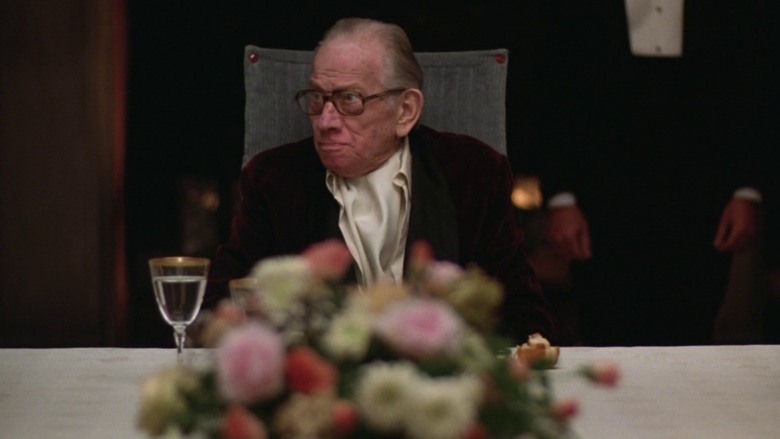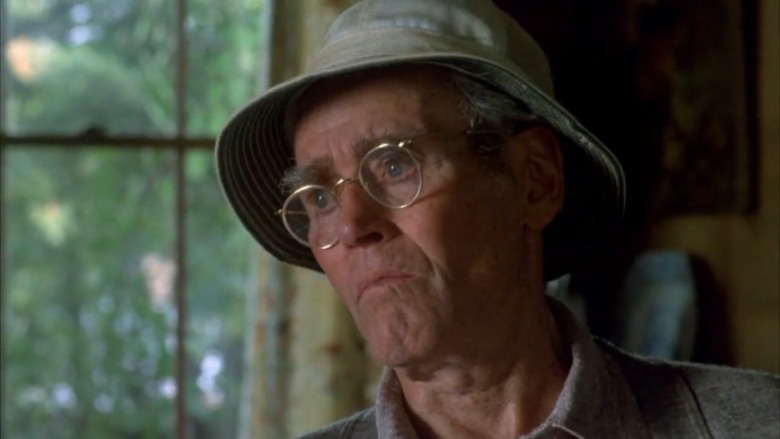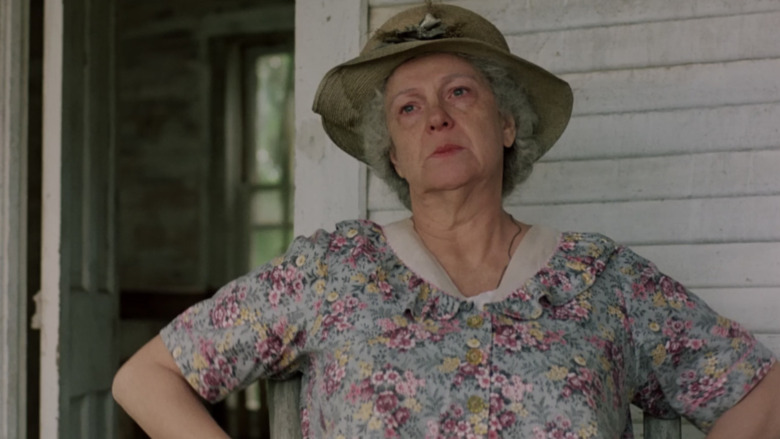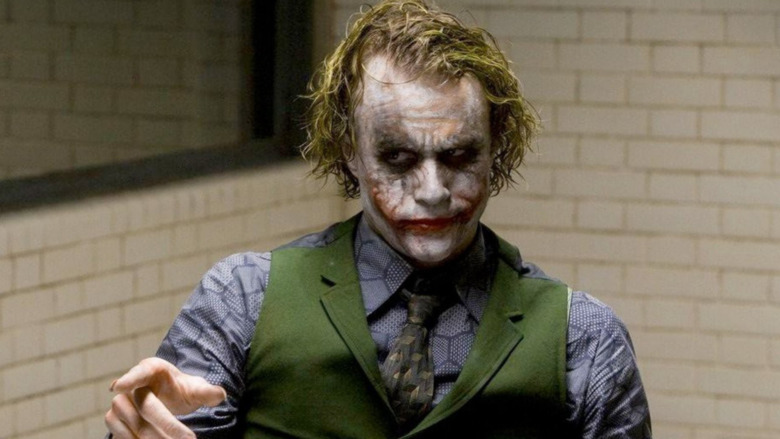Actors Who Gave Oscar-Winning Performances Just Before They Died
One of the joys of the Academy Awards is looking back on the sheer range of Oscar-winning talent in the course of the organization's nine-decade history. While there's still a long way to go in terms of diversity of race, ethnicity, gender, and sexual orientation, the acting categories alone represent a broad selection of performers, from newcomers to veterans and everything in between. Sometimes actors land the role that will win them their Little Gold Man early; sometimes they act for years before it arrives out of nowhere. Other times, it arrives at the very end of their careers, whether they know it at the time or not.
Looking back over the history of the Oscars' four acting awards, there are several major winners who ended up delivering their award-winning performances close to the end of their lives. In some cases, we're talking about storied actors who finally collected a statue in the twilight of their working years. In others, we're talking about a life that was suddenly cut tragically short. Either way, these victories are worth remembering, and with all that in mind, here's a fond look back at the actors who delivered their Oscar-winning performances just before they died.
Marie Dressler: Min and Bill
For actors of all ages, an Academy Award is supposed to be a gateway to a wider world of acting options. It's a rocket you can ride to whatever opportunities you choose. That should have been the case for Marie Dressler, and even though she didn't die immediately after winning her Oscar, what happened in the aftermath did cut her rocket ride tragically short.
Dressler was a show business veteran who began her rise on the vaudeville stage before transitioning to Broadway and then taking some of her most popular comedic performances to the screen in the silent era of the 1910s. Like many performers during this period of time, the changing Hollywood landscape proved challenging for Dressler, and she spent much of the 1920s without being able to book a single film role.
Finally, after struggling financially for years, the late 1920s and the introduction of sound brought about a career renaissance for her. In 1932, Dressler won the Academy Award for Best Actress for Min and Bill, a victory that seemed primed to catapult her to even greater stardom. She launched into more major films, including Emma (for which she was again nominated for an Oscar) and Dinner at Eight, but by 1932 she'd received a critical cancer diagnosis. Her health slowed her work to a crawl, and she died in July of 1934 at the age of 65.
Alice Brady: In Old Chicago
Few actors in Hollywood's silent era were lucky to survive the paradigm-shifting transition to "talkies" at all, but a lucky few were able to thrive in both eras. Alice Brady was one of them, against all odds. Born into a theater family, the actress began her career on the stage before starting to build her silent film resume in 1914. She worked steadily for several years before leaving the screen to focus on her stage work, leaving a 10-year gap in her filmography.
By the time she returned to the movies in 1933, Hollywood had changed dramatically, but Brady's talent was still there. She picked up right where she had left off, launching a career in the sound era that included roles in The Gay Divorcee, Gold Diggers of 1935, and My Man Godfrey alongside Carole Lombard, for which she was nominated for an Oscar in 1937.
Just a year later, Brady received her second Oscar nomination for In Old Chicago, this time winning the Best Supporting Actress award, but the afterglow was to be short-lived. Brady was diagnosed with cancer, and though she continued working until just a few months before her death, she was only able to complete four more films. She died in October of 1939 at the age of 46, just months after her final film, Young Mr. Lincoln, was released.
Walter Huston: The Treasure of the Sierra Madre
We can trace one of the great filmmaking dynasties in all of Hollywood back to Walter Huston, who began his career in theater and worked through vaudeville and various other stage projects before his screen acting career started to gain traction in 1929. Huston would spend the next two decades working steadily as a character actor, and his prominence helped spawn the Huston line, which includes his son, the director John Huston; his grandchildren, actors Anjelica and Danny Huston; and a great-grandson, actor Jack Huston. It's perhaps only fitting, then, that the film for which Huston finally won his Oscar ended up being a family affair.
In The Treasure of the Sierra Madre, written and directed by his son, Huston played Howard, an old-time gold prospector who leads two younger collaborators (Humphrey Bogart and Tim Holt) in a search for the titular treasure. Walter Huston won the Oscar for Best Supporting Actor for his performance as Howard, and his son John won the only two Oscars of his long career — for Best Director and Best Adapted Screenplay — for the film. Sadly, Walter Huston completed just three more films before he died in April of 1950 at the age of 67.
Peter Finch: Network
After beginning his career on the stage and in radio, Peter Finch built a reputation as a powerful acting presence on the big screen, and by the 1950s he was off and running, earning international acclaim for films like A Town Like Alice, The Nun's Story, and The Trials of Oscar Wilde. Today, though, Finch is best remembered for his role as Howard Beale in the 1976 classic Network. Beale, a devoted newsman who grows fed up with his network's efforts to put profit over journalistic integrity, allowed Finch to exercise every ounce of fiery energy he had. His delivery of the line "I'm as mad as hell, and I'm not going to take this anymore" cemented his place in countless montages of the greatest movie lines of all time.
Network was one of the most acclaimed films of 1976, and earned Finch his second Oscar nomination. Sadly, in January of 1977, the day after he'd appeared on The Tonight Show to promote the film, Finch died after suffering a heart attack in the lobby of the Beverly Hills Hotel. He was 60. In the weeks after he died, his performance in Network earned him his first Golden Globe, his fifth BAFTA Award, and his first Oscar for Best Actor. At the time of the award, he was the only actor to ever win a posthumous Oscar; as of this writing, he is one of only two actors (Heath Ledger is the other) to be given the award after death.
Melvyn Douglas: Being There
In a career spanning five decades, Melvyn Douglas did it all, and to prove it, he remains as of this writing one of only two dozen people to ever complete the Triple Crown of Acting: winning Emmy, Tony, and Oscars for his performances across stage and screen. Douglas began appearing in feature films in 1931 and quickly established himself as a suave, quick-witted presence in everything from The Old Dark House to Ninotchka, which remains one of his best-known roles today. He worked regularly in features throughout the 1930s and 1940s, and in the 1950s made the successful leap to prolific television work.
In 1964, amid a return to making movies, Douglas won the Oscar for Best Supporting Actor for his role as Homer Bannon alongside Paul Newman in Hud. That success led to prolific work well into his 70s as he continued to jump from big screen to small and back again. In 1980, Douglas won his second Best Supporting Actor Oscar, this time for his role as Benjamin Rand alongside Peter Sellers in Being There. Douglas completed four more films, including The Changeling and Ghost Story, before he passed away at the age of 80 in August of 1981, a little more than a year after his second Oscar win.
Henry Fonda: On Golden Pond
In a career spanning decades, Henry Fonda left an indelible mark on the history of American cinema, becoming not just one of the most identifiable movie stars of his generation, but also an icon of American masculinity along the way. An actor known for taking roles that emphasized his own American ideals, Fonda compiled a robust collection of credits; his best-known films include Young Mr. Lincoln, The Grapes of Wrath, and 12 Angry Men, though he was also adept at screwball comedies (The Lady Eve), family stories (Yours, Mine, and Ours) and westerns (My Darling Clementine, Fort Apache). He also launched the Fonda acting dynasty, which includes his children Jane and Peter and his granddaughter Bridget.
Despite his many acting achievements, much of Fonda's career went unnoticed by the Academy. He was nominated for Best Actor for The Grapes of Wrath in 1941, and nominated as a producer for 12 Angry Men in 1958, but as Fonda entered his 70s, he had yet to win an Oscar. That changed with On Golden Pond, in which he co-starred with fellow screen legend Katharine Hepburn as an aging couple trying to mend family fences. The film earned Fonda and Hepburn Best Actor and Best Actress Oscars, respectively, giving Fonda his first and only Oscar win. He died of heart failure just a few months later, in August of 1982, at the age of 77. Hepburn acted only sporadically after On Golden Pond and lived largely in quiet retirement until her death in 2003.
Geraldine Page: The Trip to Bountiful
Some actors spend their entire careers sitting in the shadow of the Oscars, almost touching that golden statue but never quite grasping it despite decades of tantalizing near misses. That was the case for Geraldine Page. An actress who began building a name for herself on the stage in the 1940s, Page gained Academy attention at the very beginning of her film career, earning a Best Supporting Actress nomination for her role opposite John Wayne in Hondo.
Another six nominations followed with no award, including Best Actress for Summer and Smoke, Sweet Bird of Youth, and Interiors, and Best Supporting Actress for You're a Big Boy Now, Pete 'n' Tillie, and The Pope of Greenwich Village. Then, at last, came Page's part in The Trip to Bountiful.
Page's performance as an aging woman who wants nothing more than to return her rural home after years away earned her some of the best reviews of her career, as well as Golden Globe and BAFTA nominations, and she finally earned the Oscar for Best Actress in 1986. Sadly, her post-Oscar career was short-lived. She appeared in a few more films and returned to the stage for a production of Noel Coward's Blithe Spirit, and was in the middle of her run with the play when tragedy struck. On June 13, 1987, Page was found dead in her apartment at the age of 62, felled after an apparent heart attack.
Heath Ledger: The Dark Knight
Even before he started to gain the type of attention that comes with awards season Oscar buzz, Heath Ledger was widely recognized as one of the most promising young actors of his generation. His career launched on Australian television in the 1990s, and he was an instant success when he began appearing in American films like 10 Things I Hate About You and The Patriot. By the mid-2000s, he was a full-fledged movie star, and in 2005 alone he appeared in Casanova, The Brothers Grimm, Lords of Dogtown, and Brokeback Mountain. He received Golden Globe, BAFTA, and Oscar nominations for his performance in the last film, making him one of the youngest Oscar nominees in history.
Then came The Dark Knight. Hot off the success of Batman Begins, director Christopher Nolan cast Ledger as his incarnation of The Joker, and while fan skepticism was initially high, buzz from the set and early looks at the character quickly built buzz for a potentially iconic piece of superhero work. Sadly, Ledger did not live to see the full response to the film. He died in January of 2008 at the age of just 28, after an accidental overdose in his New York City apartment, months before The Dark Knight was set to premiere. When the film finally hit theaters Ledger received near-universal acclaim for his performance, and earned posthumous BAFTA, Golden Globe, and Oscar wins for Best Supporting Actor, making him only the second actor in history to win an Oscar after his death.
